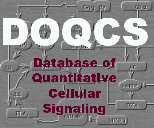
|
Enter a Search String | | Special character and space not allowed in the query term.
Search string should be at least 2 characters long. |
Molecule Parameter List for Sos | The statistics table lists the distribution of a molecule acting either as a substrate, product, enzyme or as a molecule within the network.
The text color of a molecule is highlighted by  color. color. | | Statistics |
Accession and Pathway Details | |
| Accession Name | Accession No. | Accession Type | Pathway Link | MAPK_network_
2003 | 50 | Network |
Shared_Object_MAPK_network_2003, PKC, PLA2,
PLCbeta, Gq, MAPK,
Ras, EGFR, Sos,
PLC_g, CaMKII, CaM,
PP1, PP2B, PKA,
AC | | This is a network model of many pathways present at the neuronal synapse. The network has properties of temporal tuning as well as steady-state computational properties. In its default form the network is bistable.Bhalla US Biophys J. 2004 Aug;87(2):745-53 |
Sos acting as a Molecule in MAPK_network_2003 Network
| Name | Accession Name | Pathway Name | Initial Conc.
(uM) | Volume
(fL) | Buffered | | Sos | MAPK_network_
2003
Accession No. : 50 | Sos
Pathway No. : 214 | 0.1 | 1000 | No | | I have tried using low (0.02 uM) initial concs, but these give a very flat response to EGF stim although the overall activation of Ras is not too bad. I am reverting to 0.1 because we expect a sharp initial response, followed by a decline. Sep 17 1997: The transient activation curve looks better with [Sos] = 0.05. Apr 26 1998: Some error there, it is better where it was at 0.1 |
Sos acting as a Substrate for an Enzyme in MAPK_network_2003 Network
Enzyme Molecule /
Enzyme Activity | Accession Name | Pathway Name | Km (uM) | kcat (s^-1) | Ratio | Enzyme Type | Reagents | MAPK* /
phosph_Sos | MAPK_network_
2003
Accession No. : 50 | Shared_Object_
MAPK_network_
2003
Pathway No. : 206 | 2.5641 | 10 | 4 | explicit E-S complex | Substrate
Sos
Product
Sos*
| | See Porfiri and McCormick JBC 271:10 pp5871 1996 for the existence of this step. We'll take the rates from the ones used for the phosph of Raf by MAPK. Sep 17 1997: The transient activation curve matches better with k1 up by 10 x. |
Sos acting as a Substrate in a reaction in MAPK_network_2003 Network
| Kd is calculated only for second order reactions, like nA+nB <->nC or nA<->nC+nD, where n is number and A,B,C,D are molecules, where as for first order reactions Keq is calculated.
Kd for higher order reaction are not consider. |
| Name | Accession Name | Pathway Name | Kf | Kb | Kd | tau | Reagents | | Grb2_bind_Sos | MAPK_network_
2003
Accession No. : 50 | Sos
Pathway No. : 214 | 0.025
(uM^-1 s^-1) | 0.0168
(s^-1) | Kd(bf) = 0.672(uM) | - | Substrate
Grb2
Sos
Product
Sos.Grb2
| | As there are 2 SH3 domains, this reaction could be 2nd order. I have a Kd of 22 uM from peptide binding (Lemmon et al JBC 269:50 pg 31653). However, Chook et al JBC 271:48 pg30472 say it is 0.4uM with purified proteins, so we believe them. They say it is 1:1 binding. |
Sos acting as a Product in a reaction in MAPK_network_2003 Network
| Kd is calculated only for second order reactions, like nA+nB <->nC or nA<->nC+nD, where n is number and A,B,C,D are molecules, where as for first order reactions Keq is calculated.
Kd for higher order reaction are not consider. |
| Name | Accession Name | Pathway Name | Kf | Kb | Kd | tau | Reagents | | dephosph_Sos | MAPK_network_
2003
Accession No. : 50 | Sos
Pathway No. : 214 | 0.001
(s^-1) | 0
(s^-1) | - | - | Substrate
Sos*
Product
Sos
| | The only clue I have to these rates is from the time courses of the EGF activation, which is around 1 to 5 min. The dephosph would be expected to be of the same order, perhaps a bit longer. Lets use 0.002 which is about 8 min. Sep 17: The transient activation curve matches better with kf = 0.001 |
| Database compilation and code copyright (C) 2022, Upinder S. Bhalla and NCBS/TIFR
This Copyright is applied to ensure that the contents of this database remain freely available. Please see FAQ for details. |
|
